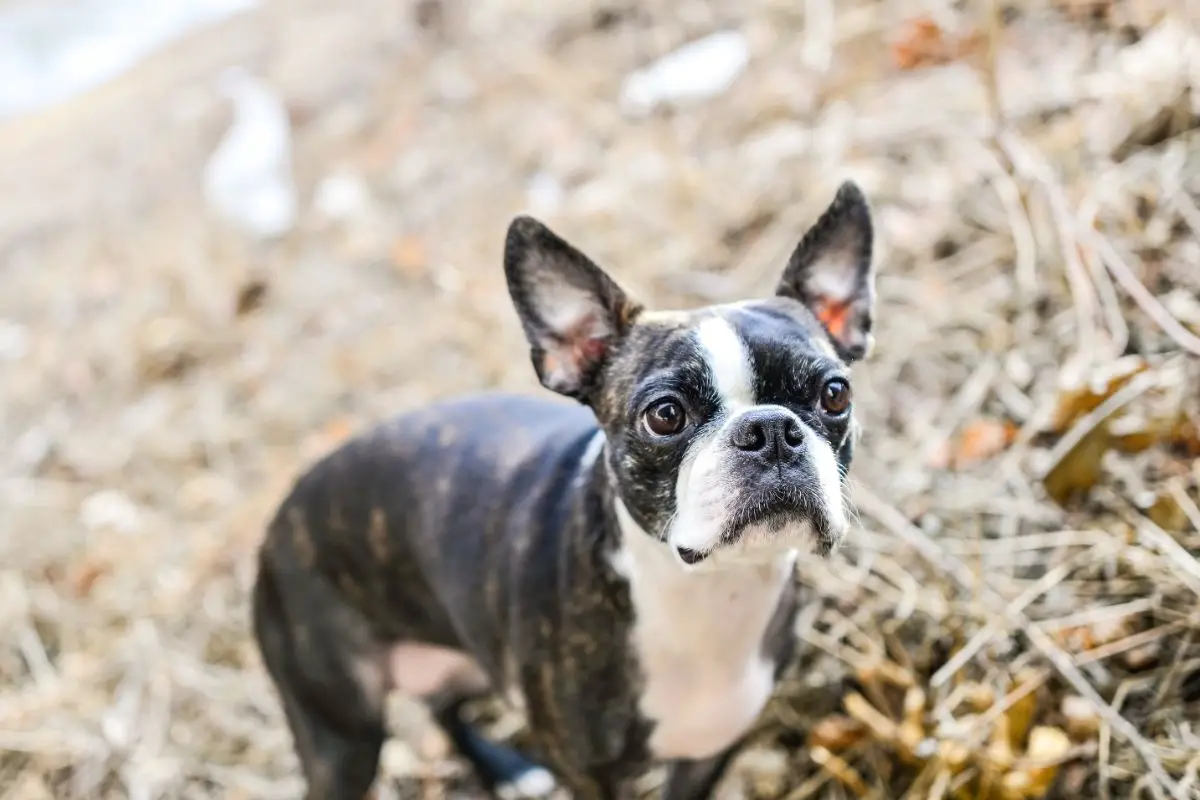If you’re a lover of toy dog breeds and are looking for a new furry friend to bring home, you may want to consider a Boston Terrier.
This terrier breed is actually number 21 on the list of most popular dog breeds in the United States, demonstrating what a good companion this breed can be.
The Boston Terrier is also known as the ‘American Gentleman’ because of its glossy coat and distinctive coloring and patterning that resembles a tuxedo.
Boston Terriers come in many colors, and while the Brindle Boston Terrier is not as popular as some others, this unique breed will make a wonderful addition to your family.
This article is a comprehensive guide to everything you need to know about the Brindle Boston Terrier before you commit to this breed.
We will be covering the physical features, temperament, diet, and grooming requirements of the Brindle Boston Terrier, plus more essential information.
Contents
- 1 Brindle Boston Terrier Color
- 2 Brindle Boston Terrier Pattern
- 3 AKC Recognition For The Brindle Boston Terrier
- 4 Brindle Boston Terrier’s Temperament
- 5 Brindle Boston Terrier Cost
- 6 Brindle Boston Terrier Health Concerns
- 7 Grooming Requirements For Brindle Boston Terrier
- 8 The Best Diet For The Brindle Boston Terrier
- 9 Final Thoughts
Brindle Boston Terrier Color
One thing that distinguishes the Brindle Boston Terrier from other Boston Terriers is its coloring.
The Brindle Boston Terrier has black brindle markings, which gives it a tiger-striped appearance.
The base color is brown.
You can also see this tiger-striped pattern in other breeds such as the Boxer, the Daschund, the Great Dane, and the French Bulldog.
In fact, Brindle Boston Terriers are often confused for Boxers, although the breeds are actually quite different.
While this particular coloration is quite rare, this only makes the Brindle Boston Terrier more special and makes these terriers stand out among their peers.
Brindle Boston Terrier Pattern
You might think that because Brindle Boston Terriers are identified by their coloring and pattern, all Brindle Boston Terriers must look the same – but that’s not the case at all!
Brindle Boston Terriers come in a variety of stripe patterns.
For example, some members of this breed might have a dark, almost back base color with lighter brown stripes, which is the reverse of the typical pattern – hence why this type of Brindle Boston Terrier is referred to as the ‘Reverse Brindle’.
These Boston Terriers also vary in terms of how much striping they have on their coats.
Some have very few stripes, while others are more or less covered with the tiger-striped pattern.
It will come as no surprise that the term for a minimally-striped Brindle Boston Terrier is ‘Minimum Brindle’ while the opposite is ‘Maximum Brindle’.
Sometimes, the brindle color is relatively close to the base color so that the tiger-stripe pattern is less visible.
A fawn brindle, for example, is not uncommon.
Other times, these terriers have dark stripes that really stand out against the base.
Another key variation is that some Brindle Boston Terriers only have a brindle pattern on certain parts of their bodies, such as the rear, whereas for other dogs, it’s consistent all over the body.
AKC Recognition For The Brindle Boston Terrier
The Brindle Boston Terrier (at least, the color variation that is typically recognized as a brindle) is not registered by the AKC (American Kennel Club).
While the Boston Terrier has been recognized by the AKC, only certain colors and patterns of Brindle Boston Terrier are represented by the organization.
If a Brindle Boston Terrier has brown eyes and a brown nose, they will be accepted by the AKC, but otherwise, only Boston Terriers with black bodies and white patches are registered.
Assuming that your Brindle Boston Terrier is one of the rare color combinations accepted by the American Kennel Club, you can fill out an application to have your dog registered.
This comes with perks such as being able to sign your dog up for canine sports if that’s an interest of yours.
You’ll also be given a 30-day insurance trial period, plus a complimentary vet visit, which can be hugely helpful from a financial perspective.
It should be noted, however, that there’s absolutely nothing wrong with owning a Brindle Boston Terrier that can’t be registered with the AKC.
It’s by no means a requirement, legally-speaking or otherwise – it’s just that there are additional luxuries to be obtained by having a registered dog.
If the love and companionship of a beautiful dog are more important to you than dog sports or cost-reduced pet healthcare, you should go ahead and bring home your Brindle!
Brindle Boston Terrier’s Temperament

If you’re looking for a dog with a sweet and happy temperament, the Brindle Boston Terrier is the perfect choice.
Brindle Boston Terriers are cheerful and fun-loving dogs that enjoy human contact and socialization.
Whether you’re single, have a partner, or have a large family with children, the Brindle Boston Terrier will fit right into your dynamic.
However, it is essential to supervise dogs around children, no matter how good-natured your dog usually is.
It’s worth noting, however, that there is no scientific evidence to support the notion that any kind of Boston Terrier is different from another temperamentally.
This means that the temperament of the Brindle Boston Terrier is, as far as we know, the same as any other Boston Terrier.
Because Boston Terriers, including the Brindle Boston Terrier, are so loyal, they can sometimes be a bit overprotective when it comes to their owners.
However, proper socialization and enough mental stimulation can ensure that your Brindle Boston Terrier maintains a friendly temperament.
It is important to bear in mind that while all this is true for the majority of Brindle Boston Terriers, there will always be exceptions.
Some of these dogs will naturally be more excitable or anxious, which can lead to difficult behavior.
If your dog has any previous experience of trauma, its naturally agreeable temperament may also be altered.
Luckily, you should be able to manage any issues through proactive and consistent training.
Brindle Boston Terrier Cost
The cost of acquiring a Brindle Boston Terrier depends on which route you choose to go down when looking for a dog.
On average, a Boston Terrier will cost between $500 and $1000.
Because Brindle Boston Terriers are rarer than other colors, you can expect to pay more for this kind of dog if you decide to purchase from a breeder.
You may be able to get a Brindle Boston Terrier for a lower fee if you decide to adopt one from a shelter.
The rarity of this Boston Terrier variety means that finding one in a shelter is more difficult, but there are definitely Brindles in shelters across the U.S. looking for homes.
You’ll just need to be prepared to open up your home to inspectors who will check that it is a suitable environment for your new friend.
Brindle Boston Terrier Health Concerns
Brindle Boston Terriers are not significantly more susceptible to health issues than any other Boston Terrier.
However, when this breed is mixed with other color combinations, we do start to see more health concerns. Some of these include:
Dry Eye
The Brindle Boston Terrier, like all Boston Terriers, is a brachycephalic breed.
This is the scientific term for a dog with a short or ‘squashed’ face.
While many people find this feature to be endearing, hence the popularity of the Boston Terrier breed, the problem with a short face is that it makes the eyes protrude further.
This leaves the eyes more exposed to various conditions, and one of them is dry eye.
Dry eye is also known by its scientific name, Keratoconjunctivitis.
This condition develops when there isn’t enough tear production to keep the eyes moist, which leads to dry and itchy eyes.
Eye infections take hold as a result.
If you notice that your Brindle Boston Terrier is pawing at their eyes or squinting more than usual, it could be a dry eye.
You might also see a discharge with a thick consistency coming from one or both eyes.
In the early stages, your dog’s eyes might simply look drier than usual.
Glaucoma
Another condition that affects Brindle Boston Terriers is glaucoma.
Glaucoma is a fairly common condition in dogs, but it can cause blindness in a short space of time, so it’s essential to be aware of the symptoms.
Glaucoma occurs when the optic nerve sustains damage, typically due to a fluid buildup behind the eye.
Watery, squinting eyes are potential signs of glaucoma, especially when accompanied by redness in the whites of the eyes or corneal bluing.
Cataracts
There is also a risk of blindness in Brindle Boston Terriers due to the breed’s likelihood of developing cataracts.
When a dog has cataracts, the lenses over its eyes will become opaque.
This leads to them losing their vision, and the only way to treat the condition effectively is through surgery.
Respiratory Issues
In addition to suffering from ocular problems, Boston Terriers, including the Brindle Boston Terrier, are prone to respiratory difficulties due to their brachiocephalic heads.
Brindle Boston Terriers might be more likely to overheat or become exhausted in hot conditions due to their impaired breathing ability, which limits their ability to pant effectively.
Because of this breed’s predisposition to breathing issues, it’s essential to keep your Brindle Boston Terrier well hydrated when the weather conditions are hot.
It is also important to ensure proper ventilation during hot weather, including providing plenty of shade or keeping your Boston Terrier inside if they are at risk of overheating.
Deafness
It would seem that Boston Terriers, with the inclusion of Brindles, are predisposed to losing their hearing at some point in their lives.
Aside from a lack of responsiveness to audible cues and commands, it can be difficult to tell if your dog is losing its hearing, so routine health checkups are important with this breed.
Obesity
Brindle Boston Terriers are more prone to obesity than some other dog breeds.
Luckily, obesity is a preventable condition as long as you stick to the daily calorie intake recommendations for your dog and avoid giving additional treats throughout the day, especially in the form of human food, which is typically much more calorific than dog food.
It’s a good idea to have your Brindle Boston Terrier weighed regularly at the vet so that you can monitor any weight gain or weight loss.
If it turns out that your Boston Terrier is a little on the heavy side, your vet can make dietary recommendations to return their weight to a healthy place.
Dental Disease
Unfortunately, Boston Terriers are prone to developing dental disease, and Brindle Boston Terriers are no exception.
Dental disease usually starts with gingivitis, which is a gum inflammation. At this stage, the condition can be managed fairly easily.
However, if the symptoms are missed and the condition is not treated promptly, the infection can spread to the tooth sockets and eventually cause decay in addition to pain and other symptoms of illness.
Symptoms of gingivitis in dogs include red, swollen, or bleeding gums.
You might also notice that your dog doesn’t want to eat as much as usual, has started favoring foods that are easy to chew, or has lost interest in chew toys.
Weight loss can occur as a result of a lack of appetite. More advanced gingivitis can cause tooth loss.
The best way to ensure that your Brindle Boston Terrier stays healthy for as long as possible is to seek preventative care because it is likely that any Boston Terrier will experience some kind of health problem at some stage in their life.
Instead of waiting for symptoms to present themselves (by which point your dog’s health may already have significantly deteriorated), you should make an appointment with your local vet as soon as you bring your Boston Terrier home.
This will ensure that your dog stays healthy enough to keep potential issues at bay, and if they do arise, you’ll be able to catch them early, which opens up the range of possible treatments and improves the prognosis.
Grooming Requirements For Brindle Boston Terrier
Brindle Boston Terriers have short coats that feel smooth to touch.
There is minimal shedding, but you should still brush the coat occasionally to keep it looking and feeling nice.
More importantly, your grooming routine should involve looking after your Boston Terrier’s nails, ears, and teeth.
Although your dog’s nails should get worn down from walking outside, you still need to cut them regularly and check inside the ears for debris or wax.
Make sure to occasionally brush your dog’s teeth, too, especially since Boston Terriers are prone to dental disease.
The Best Diet For The Brindle Boston Terrier

Boston Terriers are prone to stomach sensitivity, which means that they can be picky when it comes to their food.
Feeding these dogs the wrong food can result in excessive gas.
Take note of which foods your Boston Terrier enjoys and which foods disagree with their stomach.
Bear in mind, however, that just because your Boston Terrier likes a certain food doesn’t mean you should feed it to them.
Remember, these dogs are prone to obesity, so you need to make informed decisions about which foods will help to keep them healthy.
If a visit to the vet reveals that your Brindle Boston Terrier is on the chunky side, don’t panic.
Just listen to your vet when it comes to food recommendations.
Your dog might be prescribed weight-loss dog food to help keep them at a healthy weight.
Be careful not to lean too far in the other direction if you’re trying to correct obesity in your Boston Terrier, though.
These dogs still need to consume a certain number of calories per day to stay healthy and get all the essential nutrients that they need.
Final Thoughts
Brindle Boston Terriers are rare and unique dogs with friendly temperaments, so it’s hardly surprising that so many dog lovers in the U.S. want to open their homes to this breed.
Before you bring home a Brindle Boston Terrier, you should think carefully about whether AKC recognition is important to you.
You’ll also need to decide whether to adopt or shop, and ensure that you have thoroughly researched the health conditions that Brindle Boston Terriers are prone to.
If you’re looking for a dog with moderate energy levels, a great personality, and can afford to keep up with regular preventative vet care, a Brindle Boston Terrier may be the dog for you!



